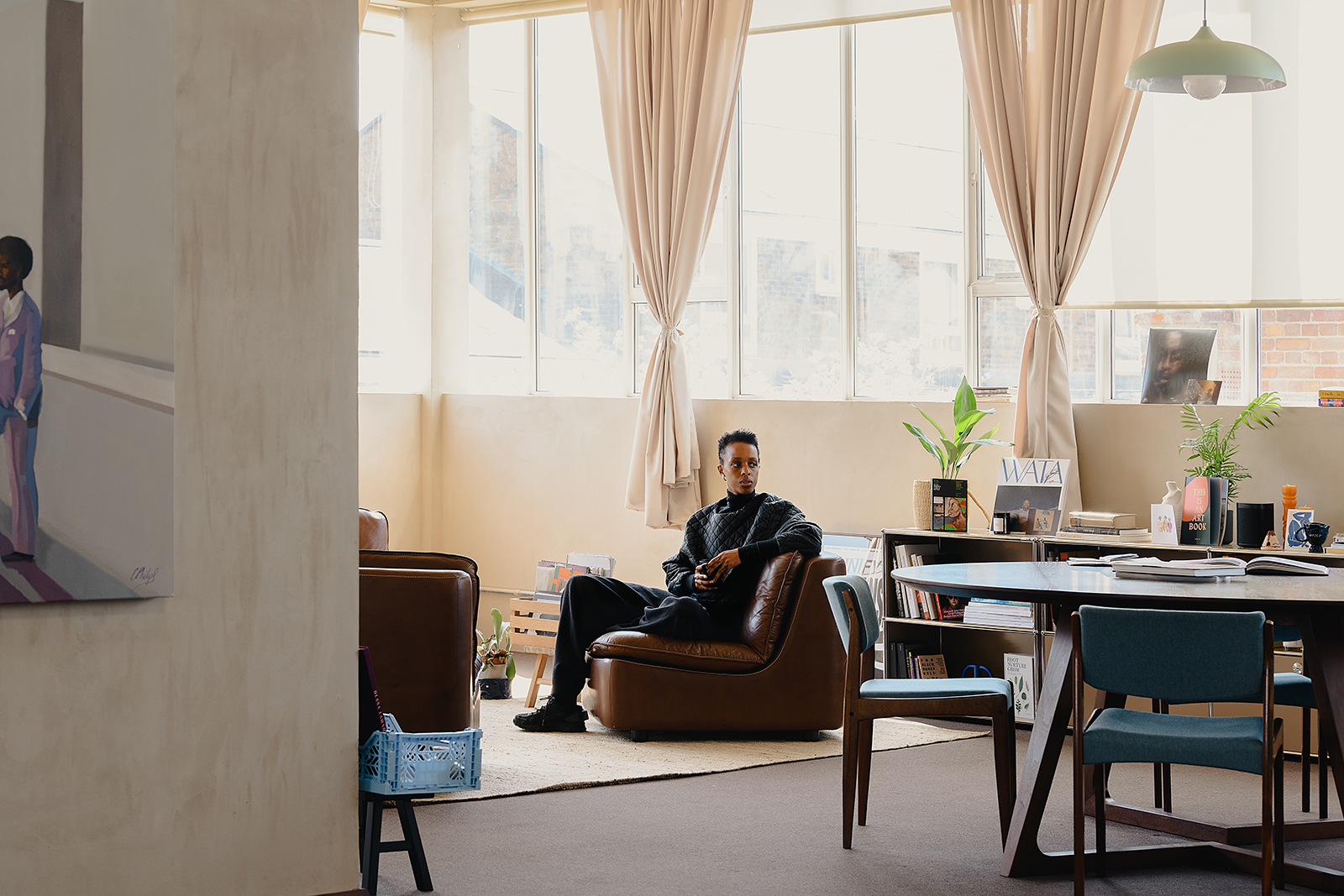A Multifunctional Creative Space
by Ronan Mckenzie
Born out of the necessity to be seen and heard, HOME presents a considered curation of exhibitions from leading and exciting artists. The lounge and co-workspace stimulate through the library of literature and arts, setting the scene for their events programme which aims always to connect and inspire.
Founded to create a distinct space with a new set of understandings of how to contextualise a diverse range of artists, building on personal experiences of institutions and providing a new infrastructure for creativity.
Black Owned. Artist Led.
Inspiration to Display information
Fidelio Ferrier
On Afro-Caribbean Religion, Black Joy & Resistance, Family, Generational Trauma by Writing, Photography and Audio-Visual Storytelling
Hypothesis: Generational Trauma
What is epigenetics?
How do you transfer trauma from generation to generation?
How does it affect your well-being and emotions? Does it affect somebody's day to day life?
How does it affect the things that we are scared of?
A conversation with Arno Hoeyberghs 26.09.2021 18:39
Black families have inherited trauma, but we can change that. When I look at my life, family, and community, I wonder: which patterns are authentically ours, and which are a result of cultural PTSD?
For me personally, there has been a desire to understand how we are affected today by what our ancestors experienced. Over the years, I have been curious about the patterns and practices I have observed in my own family. Epigenetics is the study of how certain genes are turned on or off. It is not an actual change in the sequence of your DNA, but rather changes in the structure of your DNA. This is a result of trauma experienced centuries ago that impact habits, practices, behaviours, perspectives, and fears beyond a person’s lived experience, making it a generational trauma.
For the Black community, the impact of centuries of unaddressed trauma still manifests today. And while part of that is certainly due to ongoing social injustice, some of the impact might very well be inherited.
When we consider that we are not only walking around with our own lived experiences and traumas but also those of our ancestors, we must slow down and take a hard, honest look at our past. To truly heal, we must address the cultural trauma that has always been there, shaping our perspective from birth.
As much as the Black community has been affected by the experience of chattel slavery, so has the white community. The root of denial for the dominant culture is fear, and fear mutates into all kinds of things: psychological projection, distorted and sensationalized representations in the media, and the manipulation of science to justify the legal rights and treatment of people. That’s why it’s so hard to unravel.
As the story unfolds about how our past affects our future, I am trying to do the work in the present to be mindful of what we are currently creating. Starting with my own family, I am trying to address what has been handed down to us. We can then decide what is worth keeping and what is worth letting go.
“A new art space concept is desperately needed, not only because the representation within most gallery spaces is still not diverse enough to respond to and appreciate the incredibly vast talent who is currently working, but no spaces are able to offer programming that has community and artistic development at the heart of it’s practice.
Art spaces remain hierarchal and out of reach for most - especially BIPOC audiences, making entering artistic spheres extremely difficult and maintaining a place in them even harder. Drawing on my own experiences of showing work at institutions, and working across fashion and arts, I am all too aware of the difficulties of navigating creative industries as a black female, and amongst the current offering in London, there needs to be a HOME.”
Ronan Mckenzie, Founder of HOME

The Black Archives Amsterdam
The Black Archives Podcast #4 - Winti and Music
"What is Winti? How did this Afro-Surinamese spiritual tradition originate? What was the role of music during slavery? How was and is Christianity used to suppress Winti? What is the difference between Winti music, Kaseko and Kawina? What is the relationship between the spiritual traditions in Suriname and Ghana?
During The Black Archives podcast #4 we talked to Orlando Ceder from Black Harmony, Nana Efua (Marian Markelo) from Untold Empowerment and Otmar Watson (Kodjo) about Winti and music.
Research
C.R.E.A.M. #2 w/ JeanPaul Paula - Malika Helena de Rijke // Echobox Radio 18/09/21
C.R.E.A.M. - tune in for an interview where Malika and her guests talk about some of the fundamental things in life.
Winti is an Afro-Surinamese philosophy with medical, religious, and social aspects, based on the belief in a supreme creator. In Winti, ancestors and the forces of nature are also worshipped.
Winti is a part of consciousness and identity. When you take away something that empowers the community, you create defenseless people.
Different types of rituals
A research of the Winti
Today's representation of the culture